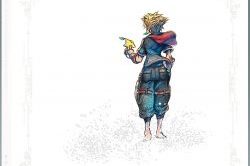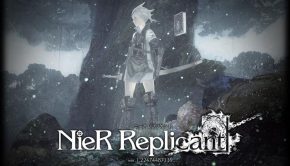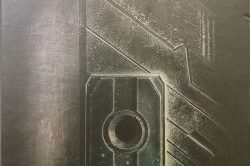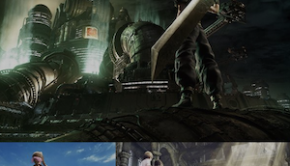Drakengard Original Soundtrack Vol. 1
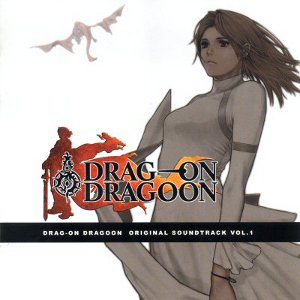 |
Album Title: Drakengard Original Soundtrack Vol. 1 (Drag-on Dragoon Original Soundtrack Vol. 1) |
| Record Label: Marvelous Entertainment |
|
| Catalog No.: MJCG-80137 |
|
| Release Date: October 22, 2003 |
|
| Purchase: Buy Used Copy |
Overview
Drakengard was a title developed by cavia and published by Square Enix for the PlayStation 2. It was described as a cross between Panzer Dragoon and Dynasty Warriors with some RPG elements thrown in for good measure. cavia chose two of the most reputable composers in Japan, their in-house sound director Nobuyoshi Sano and versatile electronic / orchestral composer Takayuki Aihara, to handle the score. They took an incredibly unique and controversial approach for the soundtrack. Initially released in two limited edition volumes, the soundtrack was eventually reprinted as a two disc set in 2011 by popular demand. The second volume of the original release is reviewed here.
Body
The Drag-on Dragoon Original Soundtrack Vol. 2 continues the approach of the first volume, twisting and looping classical performances from the Tokyo New City Orchestra to yield a unique, intense sound. Among the highlights in the second volume are the warring themes for the secondary character — Leonard, Arioch, and Seere respectively. These maintain the same dissonant orchestral approach, but have some unique twists. Leonard’s themes are comprised of stabbing violin motifs and loud sporadic orchestral bursts that have a slightly mischievous feel to it. Those from Arioch feature an unpleasant brass sample, which is looped constantly to the point of irritation. Those from Seere are a lot more enjoyable, with “Seere’s Prayer Sky” featuring some of the richest orchestral loops of the soundtrack; they sound like something that might come from an action-packed medieval film, but of course are much heavier and looped.
One of the most beautiful tracks on the soundtrack is “Ninth Chapter Sky Two”. Here Aihara shifts the focus from full orchestra to pipe organ for the first time in the soundtrack, yielding a dark and celestial sound. The first part of the track is truly engrossing, with the pipe organ creating a tremendous timbre in conjunction with the backing orchestra and chorus. The second section is more abstract with its repeated motifs and irregular motifs, but still highly effective. It directly transitions into Sano’s “Ninth Final Chapter”, where the pipe organ is almost completely swallowed by chanting chorus and piercing strings at relentless tempo. It’s an epic climactic spectacle with some fantastic transient nods to the great romantics.
One piece that needs to be mentioned is the ending vocal theme, “Route B Staff Roll Exhausted.” Eriko Hatsune’s voice seems to float above the pulsing dissonant strings and helps bring beauty to this repetitive piece. Sano has taken the liberty of playing with the volumes and distorting her voice every so often, creating an interesting effect. Overall, it’s a decent vocal piece that was revisited in the sequel. But it is perhaps the “Route C Staff Roll” that best rounds off the release. Muted trumpet sirens, aggressive timpani rolls, and dazzling string runs on loop create a gigantic sound that reflects the war is far from over. Needless to say, it’s not for all, but it is awe-inspiring.
Summary
Just like the first volume, the Drag-on Dragoon Original Soundtrack Vol. 2 captures the audacious and original approach that Takayuki Aihara and Nobuyoshi Sano developed for cavia’s epic game. The second volume is arguably the more enjoyable of the two, as it features climactic tracks including the final mission and staff roll themes, not to mention Sano’s devilish twist on the vocal ballad. However, unless you’re a hardcore collector, it’s best to skip the original print and just go for the two-disc reprint soundtrack instead. Love them or loathe them, no albums are quite like Drakengard‘s.
Do you agree with the review and score? Let us know in the comments below!
3.5
Posted on August 20, 2011 by Luc Nadeau. Last modified on September 28, 2014.

